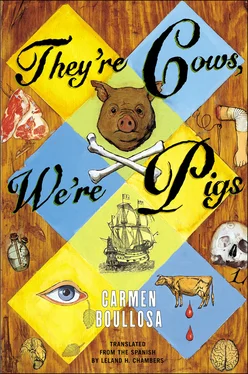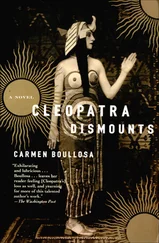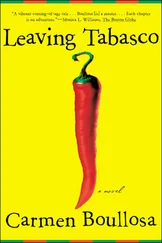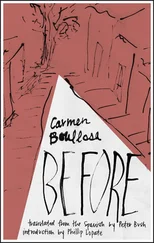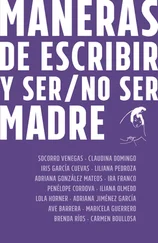“Marquesa, we are not cattle and we do not enjoy eating mud and grass, but we are accustomed to pearls. As you put it in your note, you are two of the finest gems this house possesses. We will touch nothing in it, not the money that we have found hidden away, not the silver, not the provisions. The only things we will take will be the two pearls.”
“Captain! I beg you, use me, then, but let them leave my daughter alone. I implore you!”
“Hold on, madame. Entreaties merely make L’Olonnais angry, and begging makes him furious. You are not to give me orders, you are Spanish and you have been defeated …”
And the dialogue went on in unhurried fashion, until the women, realizing themselves lost because the men were now raising their skirts with the points of their swords and ripping the fabric, tried to flee; and there in the midst of all the commotion, in front of everyone, including the girl’s mother, L’Olonnais gave it to the daughter while someone else did the mother, and I don’t know how many followed after them, one relieving the next, and when this gang was done they had other pirates brought in to keep on banging them. The abuse was so great that they were left scratched, torn where they weren’t bleeding (I saw it myself), like raw meat, with open sores in their private parts and surrounding flesh. When we all left, mother and daughter set fire to the house, I do not know where they got the strength, nor do I know how they could even get on their feet (even less do I understand how one of the two could possibly have wailed, screaming like a madwoman, again and again, I do not know which one it was, Fuck me, pirate! Fuck me, pirate! Fuck me, pirate! ); and there they died, the same day we finished raping them, the same day the freebooters turned them from prudes into whores, from whores into spoiled meat.
The assault on Maracaibo lasted for two months. In four days on Aruba we finished totaling up the booty and weighed anchor in order to distribute it en route, as the original Contract provided, since before putting in at Tortuga we were to touch at a port called Île-à-Vache on Hispaniola, in order to sell the merchandise.
L’Olonnais, with the Vice Admiral, the surgeon, and seventy of the bravest, set sail a day earlier than the rest of the fleet, aboard a sloop, the fastest ship, carrying none of the booty but very well armed, to scout the way to Hispaniola and, if needed, to clear it of enemies, as we feared an ambush.
Just a few hours after having left the rest of our men the lookout called out “Ship ahoy!” to announce a warship that possibly may have come in search of us. We quickly came up with it and got it to follow us, circling Aruba at a distance to get it away from the booty our men were guarding, and leading it back to the island again but at the opposite end from our point of departure. It was nearly nighttime when we touched land once more, and even though we had left the Spaniards behind, we weren’t so far away from them that our other men were out of danger yet if the Spanish ship should start hunting for them once they lost track of us. We anchored the ship and disembarked, together with the sloop’s artillery, in piraguas we had gotten from the Bravos. We went inland somewhat, hiding our cannons and our persons in the thickness of the underbrush, in a darkness that was not total because the moon still tinted the sky blue and the branches an opaque gray, even though it was not full and consequently did not give off an intense light.
The dwellers of the forest did not seem to be frightened by our presence. We heard them rustling, together with the leaves and the small branches, and sometimes they brushed against the coarse bark of the trees, slid over the sand, or slipped around among the smooth rocks, though such words seem to exaggerate the miniscule movements we perceived, as if the animals were moving in their sleep, amid their dreams, as if our arrival had not even awakened them. Like many of the other freebooters, I was afraid of alligators, for which reason I had picked up a dog in Maracaibo for company, but on this occasion I received orders to leave him aboard ship, shut up in the empty hold, where we knew he already felt at home and also that he would not start barking amongst the rats, and even if he did bark there it did not matter much; this was a wise order on the part of the officer because the murmurings of the underbrush would have made the dog nervous and he would have made so much noise that, even though I might pick him up to calm him, my anxiety would have left me ashiver and my heart doing nothing but turning flip-flops.
The Spanish frigate approached quietly along the coast, thinking us asleep, because our sloop gave no sign that we were awake. The moment it came sufficiently close, we assailed the enemy ship with all our guns, taking it by surprise; to do this in the darkness made up for their superiority of strength, for in their consternation they did not know whether to fire at the sloop, at the piraguas which they must have gotten sight of by this time, or at the sky, because it never entered their heads that the pirates would attack them from the protection of the trees and underbrush.
We won, as might be assumed, and at dawn, accompanied by lurid bursts of the Antilles sky, L’Olonnais accepted the enemy’s surrender, without their discovering until much too late the conditions of their defeat: in less than an hour, or a period of time that seemed very much like it, L’Olonnais had put them all to the sword: the commanding general of the foot soldiers, Captain Don Pedro de Avellaneda; the Admiral of the Fleet and Field Marshal, Don Gonzalo Suárez Ossiz; the Sergeant Major and captain of one of the companies, the battalion captain, the captain of artillery, their adjutants, the standard-bearers, the chaplains, the royal lieutenants, the quartermaster, the keeper of supplies …
Although it was not very convenient for the return of the expedition, we were forced to take their frigate for our own, as the sloop had been damaged; and we sent a piragua that skirted around the island and warned our other men of the change, waiting for its return in order not to go ahead reduced not only in speed but also in strength, while we tossed overboard everything of any weight carried by the frigate, leaving only the meager ship’s stores, which turned out to be our booty, and making room for our cannons.
When the piragua returned, it bore a youth who had been caught red-handed; when one of the Brothers had embraced him he felt some hard object under the young man’s belt and ordered him to show what he had because this was his matelot and thus obliged to obey him; and when he refused, he was beaten until he was forced to reveal it to the Brother: a heavy necklace of gold and rubies that he had found somewhere in Maracaibo and had not handed over to the Society for the just and equal division of the loot. L’Olonnais had the thief brought before him. In front of all of us he cut off the little rogue’s nose and ears. I cauterized the wounds with le Nègre Miel’s herbs. We put him on the frigate, and the day of our departure we abandoned him on an islet with a wineskin of water and a musket with powder and balls for his only company. The best thing the thief could have done with them would have been to blow his brains out before going through a prolonged agony and death in the middle of the immense ocean when the tides would have covered the little bit of earth that sustained him! No one felt sorry for the sailor because he truly deserved the punishment.
In eight days, with no other interruption, our frigate in the lead, then the fleet of pirates slightly behind, we reached Île-à-Vache, where some French buccaneers live who sell dried meat to the freebooters as well as to the merchants who come there for the purpose of doing business with the freebooters.
Читать дальше
